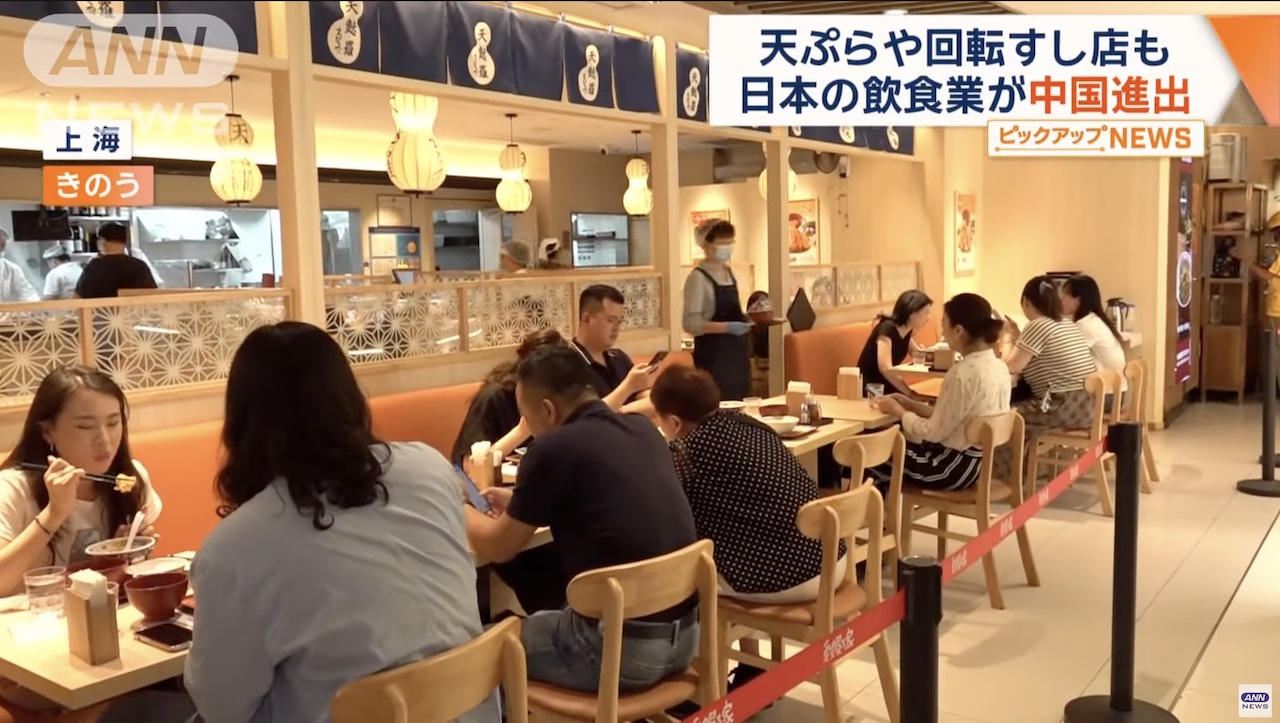BEIJING, Sep 14 (News On Japan) - Japanese food businesses are intensifying their expansion efforts in China, where consumption has stagnated due to rising food prices. We investigate the factors driving these Japanese companies to accelerate their operations in the Chinese market.
'Tenpura Ebino-ya,' a tempura restaurant from Osaka, recently celebrated its first anniversary after opening in downtown Shanghai. Its freshly made tempura bowls are a big hit among locals.
During our lunchtime visit, all 80 seats were filled, demonstrating its popularity. In the kitchen, skilled chefs prepare the tempura, with the most popular dish being the “Two Shrimp Tempura Bowl,” which includes two shrimp, squid, and white fish, priced at around 1,000 yen. Why has tempura gained such popularity?
Xie Min, Deputy General Manager at Fujio Food, Shanghai branch, said, "Many Chinese people have traveled to Japan and remember the taste of the tempura bowls they had there. They’re thrilled to find the exact same flavor here in Shanghai."
The restaurant’s appeal isn’t limited to taste.
A customer commented, "I think it’s affordable. Prices are generally high in this area, so I'm happy with this price."
As China’s economy stagnates and the desire to save increases, affordability has become a significant draw.
Japanese food chains are adopting a low-price strategy, leading to a series of new store openings. Last month, conveyor belt sushi chain Sushiro opened its first location in Beijing.
On its opening day, more than 600 groups visited the store, with some customers waiting up to 10 hours, demonstrating the restaurant's popularity.
One customer remarked, "Tuna is expensive in Beijing, so I ordered a lot."
Tuna is the most popular item, with one plate priced at around 200 yen.
Kazuo Aratani, Executive Officer of F&LC, stated, "Our commitment is to serve delicious food at affordable prices. We want customers to be pleasantly surprised by how tasty the sushi is at this price point."
In Shanghai, new restaurant openings continue.
On the first of this month, 'Yama-Ushi,' a beef bowl restaurant, opened its first store in Shanghai. The restaurant is operated by Toridoll Holdings, the company behind Marugame Seimen.
Though Marugame Seimen once expanded to around 50 locations in mainland China, it was forced to close its stores two years ago due to the pandemic. This marks the company's second attempt to break into the Chinese market.
This time, they are focusing on rice bowls. Their signature dish, the charcoal-grilled beef short rib bowl, is priced at around 500 yen.
Leveraging the experience and expertise gained in Japan, they aim to attract customers with affordable prices.
Takashi Sugiyama, Vice President of Toridoll Holdings, commented, "We are aligning our business with the current consumption needs in China, aiming for significant growth."
Japanese companies entering China are not limited to the food industry.
According to data released by Teikoku Databank last month, the number of Japanese companies with local subsidiaries or production facilities in China stands at approximately 13,000. This represents an increase of about 300 companies compared to two years ago, when many businesses were withdrawing or downsizing their Chinese operations due to the pandemic.
In addition to the growing popularity of Japanese restaurants, there is an expected increase in companies entering sectors such as elderly care services, as China continues to face demographic challenges like an aging population and declining birthrate.
Kei Nakajima, an expert on China, commented, “Japan is becoming somewhat of a brand in China. While Japanese cuisine used to be exclusive to the ultra-wealthy, it has become more accessible. However, Chinese consumers tend to lose interest quickly. Without constant menu innovation, it will be difficult to survive in this market."
Source: ANN















